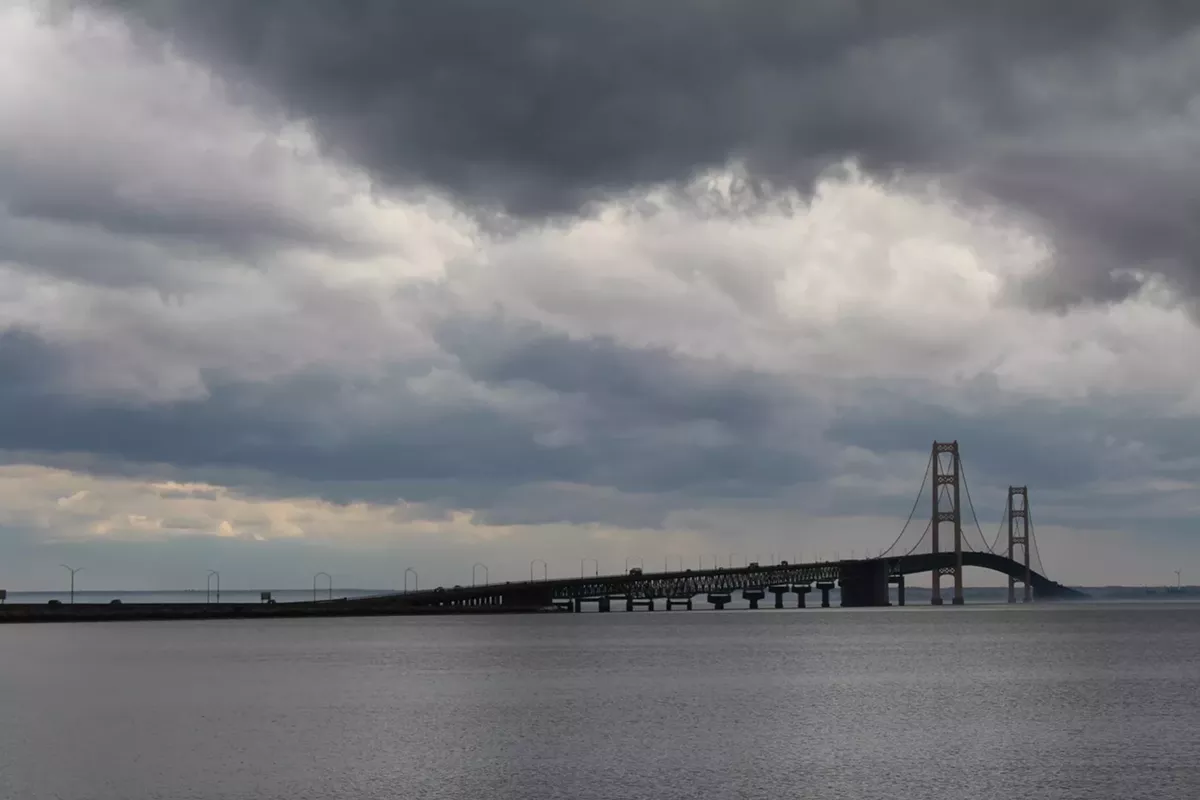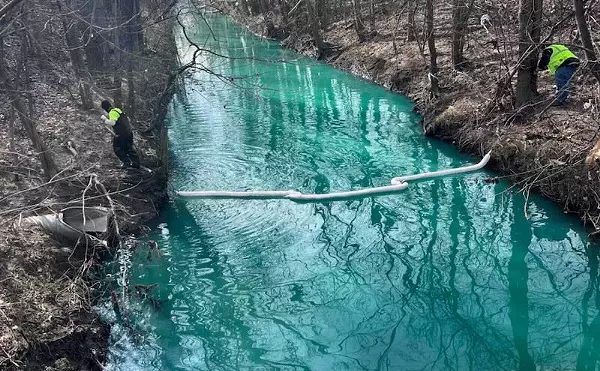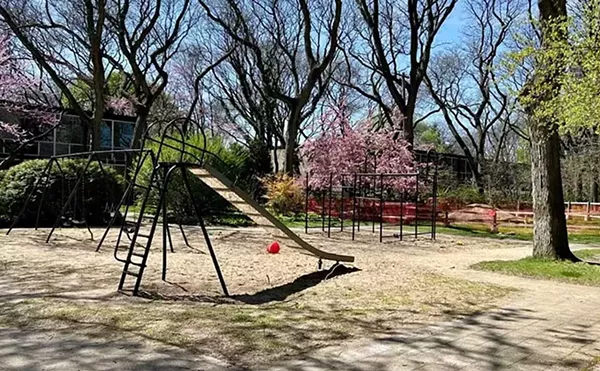Six tribes withdraw from federal talks over Line 5 tunnel permit
The tribes say plans to fast-track a tunnel permit due President Trump’s declaration of an energy emergency was “the final straw”


Audio By Carbonatix
[
{
"name": "GPT - Leaderboard - Inline - Content",
"component": "35519556",
"insertPoint": "5th",
"startingPoint": "3",
"requiredCountToDisplay": "3",
"maxInsertions": 100,
"adList": [
{
"adPreset": "LeaderboardInline"
}
]
}
]
This coverage is made possible through a partnership between IPR and Grist, a nonprofit environmental media organization.
In a rare move, six tribal nations in Michigan have withdrawn from discussions on a federal permit for the Line 5 tunnel, which the Canadian company Enbridge wants to build under the Straits of Mackinac.
Line 5 carries oil and natural gas liquids across the Straits of Mackinac. It runs 645 miles from Superior, Wisconsin, to Sarnia, Ontario. Along that route, its dual pipelines cross the lakebed of the Straits. Enbridge wants to replace that approximately four-mile section and move it into an underground tunnel.
To build the tunnel, Enbridge needs a permit from the U.S. Army Corps of Engineers, which it applied for in April of 2020. As part of that, the National Environmental Policy Act requires the Corps to conduct an environmental review.
Until last week, six tribes had been involved in that process as cooperating agencies: the Bay Mills Indian Community, Little River Band of Ottawa Indians, Sault Ste. Marie Tribe of Chippewa Indians, Grand Traverse Band of Ottawa and Chippewa Indians, Match-E-Be-Nash-She-Wish Band of Pottawatomi, and Nottawaseppi Huron Band of the Potawatomi.
But the tribes say that during a meeting on Thursday, they learned that the Corps anticipated fast-tracking the tunnel permit under President Donald Trump’s executive order declaring an energy emergency.
The tribes already had concerns about the process, but that was “the final straw,” said Whitney Gravelle, president of the Bay Mills Indian Community.
“Tribal Nations are no longer willing to expend their time and resources as Cooperating Agencies just so their participation may be used by the Corps to lend credibility to a flawed [Environmental Impact Statement] process and document,” the tribes wrote in a letter to the Corps on Friday.
They also said the Corps’ environmental review process was weighted toward Enbridge and harmed tribal nations, ignored tribal expertise, lacked meaningful dialogue, and undermined treaty rights.
“What we saw time and time again is that no matter how much evidence we collected, no matter what type of comments we provided, all of that was disregarded by the Corps,” Gravelle told IPR.
“Now we can do what we need to do outside of the process,” she added, including litigation of the Corps’ final decision.
One problem, Gravelle said, was the Army Corps’ approach to discussions of a construction that would “cause destruction to not only the Great Lakes, but also an Indigenous people’s way of life, my way of life, for all Great Lakes Anishinaabe.”
“When you’re trying to convey that type of existential crisis that you’re trying to prevent, and all you’re met with is this robotic, monotone answer, that, too, creates additional frustrations,” she said. “You know they’re not really listening to you. You know they’re not hearing what you have to say. You know that they’re not even thinking about what’s going to happen to you.”
The Army Corps’ Detroit District is still reviewing the letter, according to an email to IPR from spokesperson Carrie Fox.
“We look forward to continued Tribal consultation on treaty rights and on impacts to historic properties,” Fox wrote. “The Detroit District will consider comments from Tribes, state and federal agencies, and the public, as we prepare the environmental impact statement and make a permit decision.”
The Corps also said it was proceeding as directed by Trump’s energy emergency declaration, relying on “longstanding” regulations to speed up the permitting process for eligible projects. The Corps headquarters “instructed division commanders to establish these procedures” which will then be posted publicly, Fox wrote.
The Army Corps has determined that it won’t account for the effects of a spill from the pipeline into the Great Lakes in its permit analysis; it says doing so is beyond the scope of its authority and that such an assessment falls to the Department of Transportation’s Pipeline and Hazardous Materials Safety Administration.
Earthjustice, one of the law firms representing Bay Mills, shared an internal memo sent January 7 by then-Assistant Secretary of the Army for Civil Works Jaime Pinkham, in which he ordered the agency to assess the risk and impacts of oil spills and further consider alternatives.
Just under two weeks later, Trump’s emergency declaration directed agencies “to use, to the fullest extent possible and consistent with applicable law, the emergency Army Corps permitting provisions to facilitate the Nation’s energy supply.”
The Native American Rights Fund is also representing Bay Mills. According to David Gover, managing attorney of its Colorado office, the tunnel project won’t meet the Trump administration’s objectives, and the executive order shouldn’t apply.
“You’re talking about a project, Line 5, that serves Canadian companies and Canadian interest,” he said.
Enbridge spokesperson Ryan Duffy said in an email the company welcomes “constructive dialogue and engagement.” The company has long maintained that the tunnel will “make a safe pipeline safer while also ensuring the continued safe, secure, and affordable delivery of essential energy to the Great Lakes region.”
The federal permit from the Army Corps is one of three key permits the company needs for the tunnel. In December 2023, Michigan Public Service Commission granted it a permit to relocate the pipeline into the yet-to-be-built tunnel.
Enbridge is also in the process of redoing a permit for the Michigan Department of Environment, Great Lakes and Energy that would have expired early next year, before construction could begin.
The tribes plan to participate in that permitting process as well, and will likely challenge the outcome in court.







